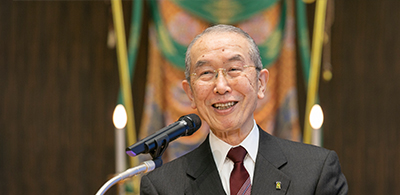Sealing the Cracks in Your Mind
August 2021

Our Minds Have Both Demons and Buddhas
Buddhism teaches us that greed, anger, and ignorance are the basic delusions that poison people’s minds. The mind that wants more than is necessary in any situation and doesn’t know how to be satisfied (the greedy mind), the angry mind, and the mind that doesn’t understand the truth about reality and only considers the immediate future (the ignorant mind) bring about jealousy, hatred, and discord and cause us to suffer.
To be human is to have these delusions, often called “the three poisons,” so of course they existed in the Buddha as well. However, the difference between us and the Buddha is our difficulty reining in our desires and anger. When we’re unable to exercise firm control of our greed or anger, we unintentionally act rashly or do something bad, which adds extra suffering to our load.
At such times, we often say things like, “I was tempted by a demon.” In Buddhist terms, this “demon” is a māra that does harm to others or distracts and disturbs our minds, hindering our practice of the teaching. However, demons don’t invade our minds from the outside. Just as the gods and the buddhas are projections of our own minds, demons are also products of our own minds.
Fortunately, chapter 26 of the Lotus Sutra, “Dharanis,” tells us that when we receive protection in the form of a dharani, even if demons probe for our weaknesses, they will be unable to take advantage of them. Therefore, even if your mind gives rise to “hungry spirits” full of greedy desire and you start to crave one thing or another, as long as you have a dharani, you can rein in your mind before it runs wild.
Words That Encourage Us to Always Be Diligent
But what exactly are dharanis? And how do we attain them? Rissho Kosei-kai defines a dharani as something with the power to stop all forms of evil and promote all forms of good. It also explains that dharanis are mysterious words that, through their recitation, allow you to directly enter the realm of the buddhas.
To rephrase this a little more simply, a dharani is an incantation that has the power, when recited, to suppress greedy, angry, and self-centered thoughts and activate your inner buddha mind.
In a previous issue, I mentioned a phrase, atomiyo sowaka (“review what you’ve done, svāhā”), which comes from the early eighteenth-century Bushido text Hagakure (Eng. “hidden by the leaves”). This phrase reminds us to look and see if we’ve forgotten something, or to double-check our work. In other words, it’s a dharani urging us to review our actions.
As svāhā is a word invoking buddhas that also has the meaning of “completely accomplishing a goal,” it calls forth our inner buddha and turns on the switch that returns us to our buddha minds. When I feel the blood about to rise to my head, in my mind I chant, on nikoniko hara tatsumaizoya sowaka (“smile, don’t lose your temper, svāhā”). By doing so, the wave of emotion calms down and I can refrain from saying or doing something regrettable.
No matter how strong-willed you may be, it’s difficult to overcome the temptations of greed, anger, and ignorance that are likened to demons. However, as long as you have a “dharani” switch that turns on self-reflection whenever cracks seem to be forming in your mind, you can seal the cracks and change your frame of mind before the demon springs into action. In my understanding, the “Dharanis” chapter teaches us how to do this because, although we’ve vowed to pursue the bodhisattva way, we often become confused or worried.
While the traditional usage of dharanis focuses on fulfilling a wish by chanting difficult words without understanding their meaning or logic, all dharanis have the power to always bring us back to the path of diligent practice and inspire us.
What, then, is your own personal dharani? It’s something you devise and master that helps you seal any cracks that form in your mind.




